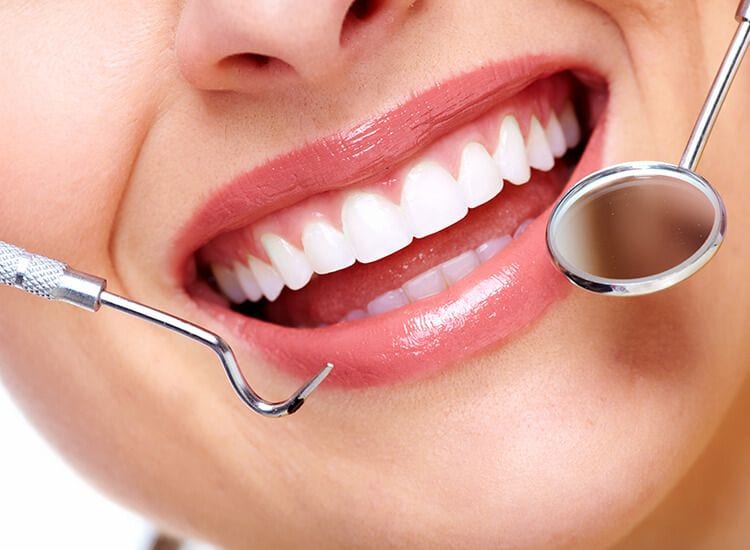
When visiting the dental clinic, price is a big factor to consider. While it’s imperative to maintain good oral health, not everyone is able to afford expensive dental treatments. Choosing a dental clinic that offers both high-quality services that fits within your budget is a great way to keep your teeth in top condition. A usual trip to the dentist includes a basic checkup, fluoride treatment, bitewing X-rays, and more.
Knowing what to expect on how much a dental checkup costs can go a long way towards helping you sustain a regular trip to the dentist. Today we’ll be taking a look at the average cost for dental treatments in Western Australia.
Basic checkup
A basic checkup is one of the best things you can do to maintain a beautiful smile (along with regular flossing and brushing) and can help save you thousands of dollars in the long term. The dentist can identify issues in your teeth like tooth decay and fix them before the problem worsens. During a checkup, the dentist will inspect the condition of your teeth and look for plaque formation and gum disease.
The rest of your mouth will also be inspected to see if there are any potential issues that need to be addressed. On average, you can expect to pay anywhere from $60-$70 and that doesn’t include cleaning. Some clinics offer a free check-up to new patients and the most expensive check-up costs around $200 and more (including fluoride treatment and cleaning).
Fluoride treatment
Fluoride treatments help protect your teeth against cavities and tooth decay by using high concentrations of fluoride that are much stronger than those found in toothpaste. As a mineral, fluoride strengthens your teeth’s enamel (the hard outer layer of teeth). A fluoride treatment usually costs anywhere from $20-$40. Sometimes a fluoride treatment can be included in a scale and clean which we’ll talk about below.
Scale and clean
Along with a basic checkup, most dentists recommend their patients to undergo a scale and clean treatment. The dentist will evaluate the condition of your teeth and recommend a scale and clean if necessary. During the treatment, the dentist will remove tartar and plaque buildup from your teeth to eliminate bacteria. They use ultrasonic scaling instruments that come with a vibrating tip to break the tartar before spraying it with water to wash it away.
The average cost for a scale and clean treatment can be around $30-$300 (this depends on how severe the plaque buildup is and how many teeth are affected). A check-up with a scale and clean treatment can cost anywhere from $130 and above. The level of treatment will vary between each dental clinic with some providing a more thorough clean than others.
Bitewing X-rays
Depending on your oral health and your previous exposure to X-rays, your dentist might recommend you getting bitewing X-rays. This helps the dentist get a good idea of your teeth in a deeper level like diagnosing an abscess, cyst or disclose any changes to the teeth’s root structure. Expect to pay around $80-$110 for a bitewing X-ray when you visit a dentist.
Other dental treatments
In addition to the aforementioned dental treatments, you may require further complex procedures if your oral health has severely deteriorated. When thinking about how much an extra treatment costs, the faster the dentist can fix the problem, the cheaper the cost will be. For example, a small tooth decay might require a filling that costs $150, but if the cavity is too large, you might need a root canal treatment or tooth extraction. These procedures can cost thousands of dollars ($2,000 and above).
How to reduce dental treatment costs
To get the most value for your money, you want to make sure you’re receiving more in benefits than you pay premiums. This where rebates come in. The average rebate from private health insurers is around $85 (this applies to check-ups with scale and fluoride treatment included). Of course, this will all depend on your policy as some policies offer 100% of the cost.
Dental rebates will differ not only across funds, but also between the policies within the funds as well as the service to be claimed. Aside from the rebates, you can also check the annual limits of each category (e.g. different upper limits for general and major dental treatments) as well as the lifetime limits on orthodontic treatments.
Because of the lack of set prices for dental services, don’t be surprised if there are massive differences in price. Things like the equipment used, the quality of the facilities, and whether they work on the public or private field will all influence the price of their services. Lastly, do thorough research on the dental clinics available in your area such as the Number one dentist in joondalup which has its location in the name. Obtain as many quotes from different clinics as possible and compare their prices to see which one fits your budget accordingly.
